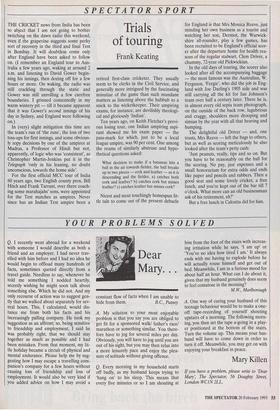SPECTATOR SPORT
Trials of touring
Frank Keating
THE CRICKET news from India has been so abject that I am not going to bother switching on the dawn radio this weekend, even if the grapevine suggests some perky sort of recovery in the third and final Test in Bombay. It will doubtless come only after England have been asked to follow on. (I remember an England tour to Aus- tralia a few years ago, waking at around 2 a.m. and listening to David Gower begin- ning his innings, then dozing off for a few hours or more. On waking, the radio was still crackling through the static and Gower was still unrolling a few carefree boundaries. I grinned contentedly in my warm wintery pit — till it became apparent that it was Gower's second innings of his day in Sydney, and England were following on.) In (very) slight mitigation this time are the team's run of 'the runs', the loss of two toss-ups for first innings, and some obvious- ly ropy decisions by one of the umpires at Madras, a Professor of Hindi but not, apparently, of logic who was 'consistent', as Christopher Martin-Jenkins put it in the Telegraph 'only in his leaning, no doubt unconscious, towards the home side'.
For the first official MCC tour of India 60 years ago, two English county pros, Bill Hitch and Frank Tarrant, over there coach- ing some marahajahs' sons, were appointed for the Test matches as umpires. Never since has an Indian Test umpire been a retired first-class cricketer. They usually seem to be clerks in the Civil Service, and generally more intrigued by the fascinating minutiae of the game than such mundane matters as listening above the hubbub to a snick to the wicketkeeper. Their umpiring exams, for instance, are devilishly theologi- cal and gloriously 'Indian'.
Ten years ago, on Keith Fletcher's previ- ous losing tour, one Indian umpiring aspi- rant showed me his exam paper — the pass-mark for which, just to be a local league umpire, was 90 per cent. One among the reams of similarly abstruse and hypo- thetical questions asked:
What decision to make if a batsman hits a ball in the air towards fielder, the ball breaks up in two pieces — cork and leather — as it is descending and the fielder, a) catches both cork and leather? b) catches cork but misses leather? c) catches leather but misses cork?
Nicest and most touchingly homespun lit- tle tale to come out of the present debacle for England is that Mrs Monica Reeve, just minding her own business as a tourist and watching her son, Dermot, the Warwick- shire all-rounder, play a few games, has been recruited to be England's official scor- er after the departure home for health rea- sons of the regular stalwart, Clem Driver, a chummy, 72-year old Pickwickian.
In the old days of touring, the scorer also looked after all the accompanying baggage — the most famous was the Australian, W. Ferguson, 'Fergie', who did the job in Eng- land with Joe Darling's 1905 side and was still carrying all the kit for Ian Johnson's team over half a century later. There he is, in almost every old sepia team photograph, on the outside of the back row, lugubrious and craggy, shoulders more drooping and simian by the year with all that heaving and humping. The delightful old Driver — and, one trusts, Mrs Reeve — left the bags to others, but as well as scoring meticulously he also looked after the team's petty cash: `Just peanuts, really, tips and so on. But you have to be reasonably on the ball for the scoring. No pay, just expenses and a small honorarium for extra odds and ends like paper and pencils and rubbers. Then a good seat and some lovely cricket, a free lunch, and you're kept out of the bar till 7 o'clock. What more can an old businessman ask of his retirement, eh?'
But a free lunch in Calcutta did for him.


























































 Previous page
Previous page